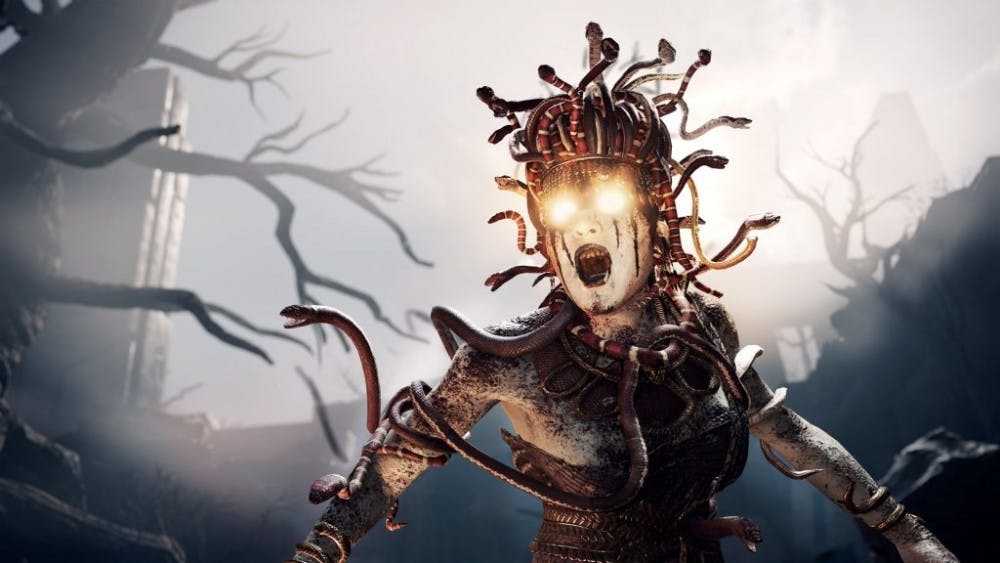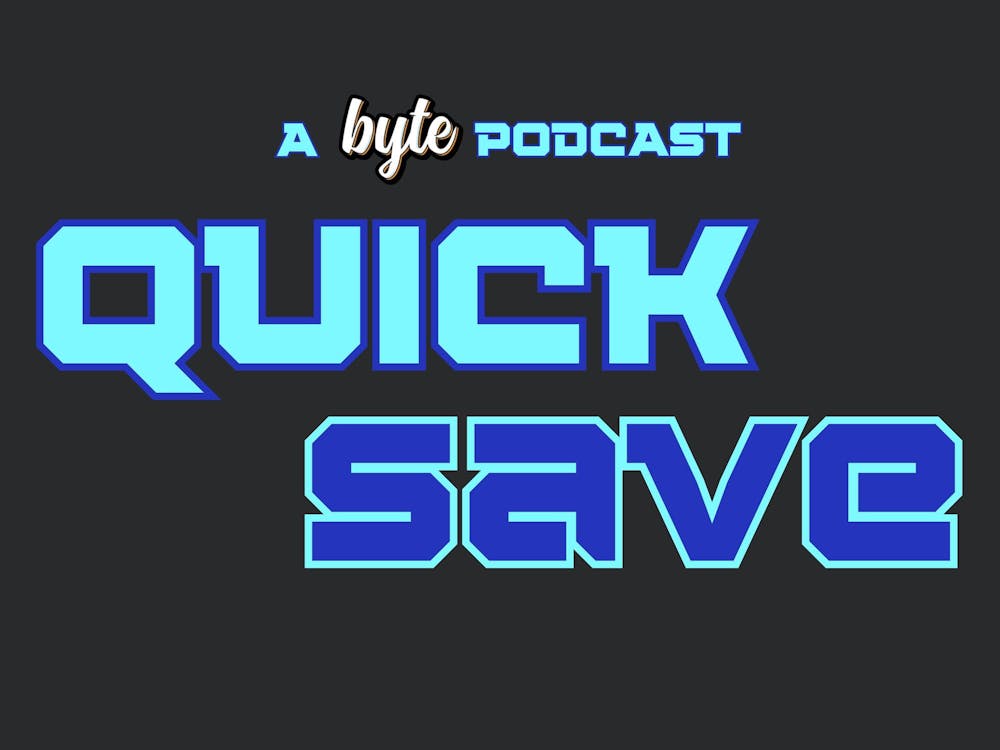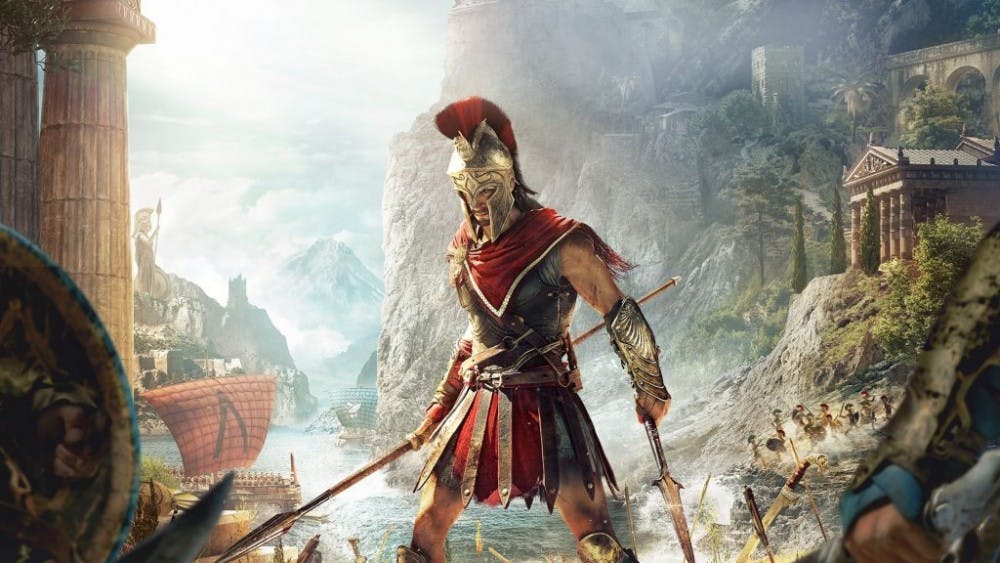Disclaimer: This review is of the Xbox One version, and was done in a playthrough as Kassandra
Last year, Ubisoft released Assassin’s Creed Origins. The game took the franchise in a new direction, taking place in ancient Egypt and focusing on the origins of the Assassin’s Brotherhood. The biggest change the game made was to its combat, now akin to the combat in The Witcher III. Origins was considered a welcome change, and many thought that the next game would take place in the Roman Empire. However, Ubisoft threw the fans a curveball with the latest installment, Assassin’s Creed Odyssey, taking place in ancient Greece—and it is an excellent follow up to Origins.
Great characters and massive scope

Image from Steam
Taking place during the Peloponnesian War between Sparta and Athens, the game follows either Alexios or Kassandra, Spartan mercenaries who find themselves thrust into the war when they are hired by a rich man named Elpenor to assassinate a famed general known as “The Wolf of Sparta”. However, this assignment leads to them discover the secret Cult of Kosmos, who have influence and footholds into every aspect of Greek society, including the famed Oracle of Delphi. The Cult plans to use the war between Athens and Sparta to their advantage, and use it to take over Greece. The mercenary finds themself fighting for both sides in the war, as well as hunting down members of the cult, and even tracking down their own long-lost parents.
One could easily criticize the game’s aspect of choosing between a male and female player character as nothing new, since Assassin’s Creed Syndicate allowed the player to play as either a male or female character. While both aspects may seem similar at first glance, there are differences between the two. Syndicate allowed the player to switch between characters at will in any point of the game. Odyssey, on the other hand, let’s the player choose the character from the start, and they are stuck with said character until the bitter end.
Speaking of characters, it is one of the major strengths of the game. Both Alexios and Kassandra are excellent lead characters, having a natural likability and charisma to them. Their past makes them engaging, which involves their father Nikolaos throwing them off a cliff by the order of the Oracle of Sparta. This likability also extends to their allies, including the real-life historian Herodotus, and Barnabas, a sea captain who transports the player around in his ship, the Adrestia. Barnabas proves himself a very fun character to be around, with his amicable personality and tales of sea life offering some interesting interactions with Alexios or Kassandra.

Image from Steam
What helps elevate the story and characters is the game’s detailed recreation of ancient Greece. The world is vivid and beautiful, with the types of buildings, houses, and monuments being recreated in painstaking detail ranging from the city of Athens to Thermopylae. The depth of recreated ancient Greece, along with the sheer scope of the world, makes the game a treat to play.
However, a major flaw is in the pacing of the story, at least in the beginning of the game. It takes a while to get to the main story, in which the mercenary hunts down the members of the Cult of Kosmos. That point comes in at roughly the ten-hour mark. Before that is the initial meeting with Elpenor, leaving the island of Kephalliona, and doing favours for Spartan army to gain an audience with the Wolf. It feels like a slow build-up to get into the main events of the game. This honestly makes the first ten hours feel somewhat tedious to play. But once the main plot gets rolling, the pacing improves by leaps and bounds.
Excellent, expanded gameplay
One of the major strengths of Assassin’s Creed Origins was the revamped gameplay, which added in more RPG elements compared to its predecessors. Odyssey takes those RPG elements and expands upon them greatly. The game features dialogue options, which can alter the direction of where a conversation or encounter goes, allowing the player to solve a conflict peacefully or make it worse through violence. Similar to a Bioware game such as Mass Effect or Dragon Age, there are moral choices that allows to player to either kill or spare a target. The decisions one makes have ramifications on the story, whether they be minor or major. This makes each experience different and unique from the kinds of choices one makes.
However, the expanded RPG elements are not the only change in gameplay. Odyssey takes enjoyable elements from previous titles, and refines them for a fun and enjoyable experience. Combat in the game is mostly unchanged from Origins, quick and face-paced with the ability to use a variety of weapons, skills, and abilities to defeat enemies. The biggest change is that the iconic hidden blade from the previous Assassin’s Creed games have been replaced with the Spear of Leonidas, which Alexios/Kassandra use for stealth takedowns, as well as combat. The spear can be upgraded throughout the game to gain new abilities.

Image from Steam
Another element that is expanded is naval combat, which has been greatly expanded. In fact, it is now similar to the naval combat of Black Flag. Alexios/Kassandra has a ship named the Adrestia at their beck and call, using it to traverse the Greek isles. The ship can be upgraded with better armor and weapons then used to fight enemy ships. Boarding parties can even be formed with soldiers and mercenaries the player has recruited. These parties can help capture enemy crews for loot and resources.
However, a surprising addition to the game is the Conquest Wars between the Spartans and the Athenians. Like the conquests in Assassin’s Creed Syndicate, the player can fight for either side, sabotaging forts and killing enemy soldiers until their influence in the area is diminished. Once that is completed, the player can take place in a conquest battle, where both armies fight it out until one side is victorious. It is a fun way to gain experience and acquire different, rare equipment.
However, there is a drawback to the game now becoming a full-fledged action RPG, and that is grinding—the bane of any RPG. The game is dependent on grinding, whether it be for crafting resources, stronger equipment, or experience points for leveling up. And this is usually found through exploration, completing side quests, or fighting enemies. This can get tedious and frustrating after a point, even for those who are experienced with RPGs. However, this dependence on grinding is balanced out by the fun gameplay and content.

Images: Steam
Featured image: Microsoft Store
For more entertainment related content, visit us at Byte BSU!



















